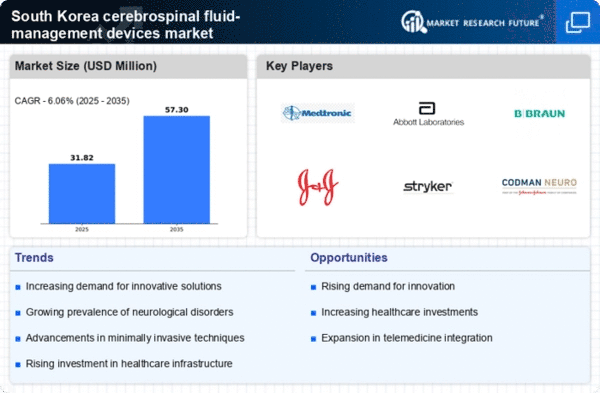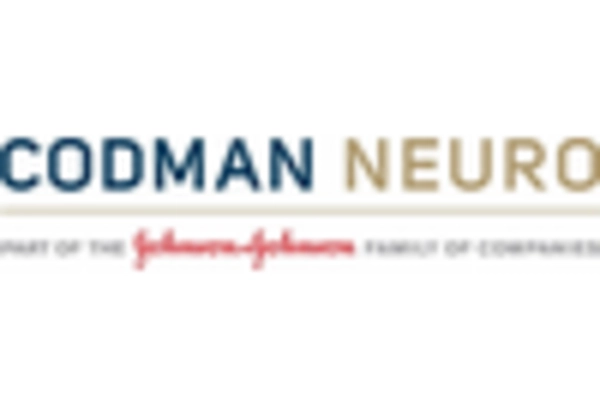Advancements in Medical Technology
Technological innovations play a pivotal role in shaping the cerebrospinal fluid-management-devices market. The introduction of smart devices equipped with advanced monitoring capabilities enhances the precision and effectiveness of cerebrospinal fluid management. For instance, devices that integrate real-time data analytics and remote monitoring features are gaining traction among healthcare professionals. This trend is particularly relevant in South Korea, where the healthcare sector is increasingly adopting digital health solutions. The market for cerebrospinal fluid-management devices is projected to grow at a CAGR of around 8% over the next five years, driven by these technological advancements. As hospitals and clinics invest in state-of-the-art equipment, the demand for sophisticated cerebrospinal fluid-management devices is likely to rise.
Government Initiatives and Funding
Government support and funding initiatives significantly influence the cerebrospinal fluid-management-devices market. In South Korea, the government has been actively promoting research and development in the medical device sector, particularly for neurological applications. Financial incentives and grants are provided to companies developing innovative cerebrospinal fluid-management solutions. This support not only fosters innovation but also encourages collaboration between public institutions and private enterprises. As a result, the market is expected to witness a surge in new product launches and enhancements, catering to the evolving needs of healthcare providers and patients alike. The infusion of public funds is likely to stimulate growth in the cerebrospinal fluid-management-devices market.
Increasing Incidence of Neurological Disorders
The rising prevalence of neurological disorders in South Korea is a crucial driver for the cerebrospinal fluid-management-devices market. Conditions such as hydrocephalus, multiple sclerosis, and traumatic brain injuries are becoming more common, necessitating effective management solutions. According to recent health statistics, the incidence of hydrocephalus alone has increased by approximately 15% over the past decade. This growing patient population creates a heightened demand for cerebrospinal fluid-management devices, as healthcare providers seek to improve patient outcomes and reduce complications associated with these disorders. The increasing burden on healthcare systems further emphasizes the need for innovative and efficient management solutions, thereby propelling the market forward.
Aging Population and Increased Healthcare Expenditure
The demographic shift towards an aging population in South Korea is a significant driver for the cerebrospinal fluid-management-devices market. As individuals age, the risk of developing neurological conditions increases, leading to a higher demand for effective management solutions. The elderly population is projected to reach 20% of the total population by 2030, which will likely escalate healthcare expenditures. This trend compels healthcare providers to invest in advanced cerebrospinal fluid-management devices to address the specific needs of older patients. Furthermore, increased healthcare spending by both the government and private sectors is expected to enhance the accessibility and availability of these devices, thereby propelling market growth.
Rising Awareness and Education on Neurological Health
There is a growing awareness and education regarding neurological health issues among the South Korean population, which serves as a catalyst for the cerebrospinal fluid-management-devices market. Public health campaigns and educational programs are increasingly focusing on the importance of early diagnosis and treatment of neurological disorders. This heightened awareness encourages patients and families to seek medical attention sooner, leading to an increased demand for cerebrospinal fluid-management devices. Additionally, healthcare professionals are being trained to recognize and manage these conditions effectively, further driving the market. As awareness continues to rise, the cerebrospinal fluid-management-devices market is likely to experience sustained growth.

















